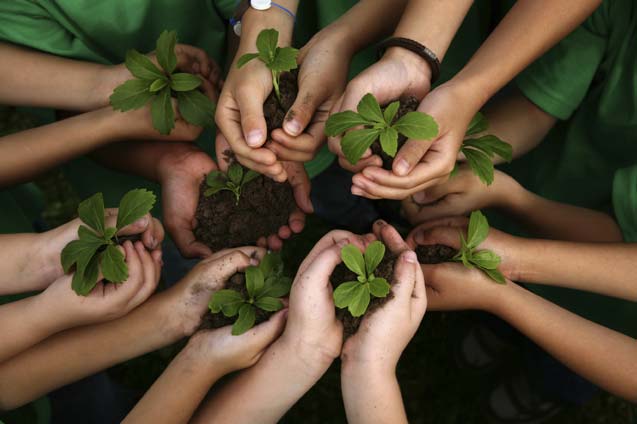Gardening with Kids Kids are apparently more likely to eat vegetables when they have grown them themselves. A National Trust Survey conducted in the UK of 1000 kids aged 8-12 found that almost two-thirds would rather eat their own homegrown fruit and vegetables than those bought from the supermarket. Naturally, this entails having their own gardening space, which according to the research, a majority of the kids also want. Children love to jump at the opportunity to get their hands dirty and there are many ways in which they can pitch in and get excited about growing plants. Whether you dig up the ground, build a raised bed, grow in a greenhouse or fill containers, the act of caring for plants and learning where your food comes from is a wonderful and valuable lesson for children. Check out some of our reasons and tips for gardening with kids below. A garden encourages you to spend time together out of the house Tending a garden is an excellent reason to get out of the house. It requires little but regular care, usually just a few minutes of weeding and watering each day, which is perfect for a small child’s limited attention span. Most kids will jump at the prospect of being told to dig in the dirt, pick weeds, plant bulbs, and soak the earth with a hose. Grow vegetables that your child wants to eat Picky eaters are more likely to eat vegetables that they have harvested themselves. They'll become curious about the growing process and want to sample the fruits of their labour. Let your kid choose which vegetables he or she wants to grow, and add a few that you’d like them to try. Go together to buy seeds or seedlings at a local nursery. After planting, watch the parental instincts emerge as your child tries to care for the baby plants. A garden is an outdoor classroom Teach your kids the names of the plants, insects, birds, animals, butterflies, soil and compost that you see on a daily basis while working in the garden. Kids love learning about nature and memorizing facts. From integral earthworms to yucky potato beetles, you could be fostering your child’s future love for biology by poking around in the dirt. Gardening is good for the world The more people who take responsibility for even a small portion of their food production, the better off we’ll all be. Growing food teaches kids about what sustainable agriculture should look like. Instead of vast mono-crops, kids can learn about the importance of genetic crop diversity. Try growing unusual varieties of vegetables -- yellow tomatoes, blue carrots, and purple potatoes. Grow a healthy mind Gardening is so psychologically stimulating that horticulture therapy programs are used in hospitals, domestic abuse shelters, nursing homes, mental health institutions, and prisons. Community gardening is also popular and even schools are introducing vegetable gardens. This is because gardening makes for happy people and happy land. It teaches kids to become aware of the seasons and what can be grown in a local environment at certain times of the year, instead of taking imported fruits and produce for granted. Here are some tips to help you garden with your children:
For more info to help you garden with kids, keep an eye on our website for cool and creative ideas in the garden. www.wintergardenz.com.au.
2 Comments
john
17/12/2023 08:38:12 pm
Your blog post hit the mark! It was informative, engaging, and had a personal touch. I enjoyed the anecdotes you shared. For more on this subject, <a href="https://0be70f630dir5wbsn8-lx-ze0w.hop.clickbank.net" target="_blank">click here</a>.
Reply
Shailesh
23/12/2023 02:48:43 am
The practical tips and actionable advice you shared in this article are highly valuable. If you're ready to put those tips into practice, <a href="https://medicinalseedkit.com/kit/#aff=Shailesh_11" target="_blank">click here</a> for a downloadable checklist.
Reply
Leave a Reply. |
The Glasshouse Company Australia
Manufacturers and Suppliers of Horticultural Structures and Equipment Archives
November 2015
Categories |


 RSS Feed
RSS Feed
